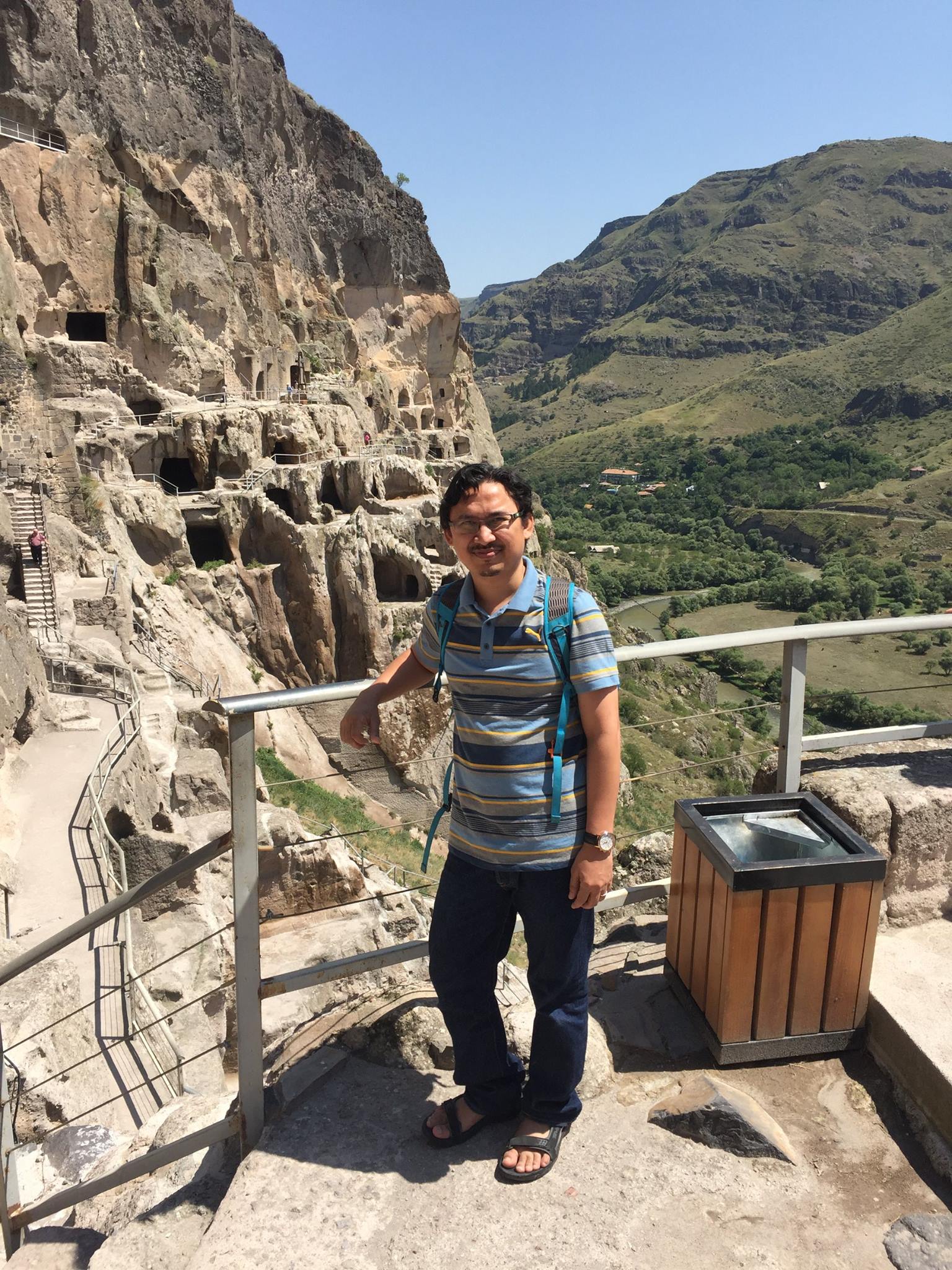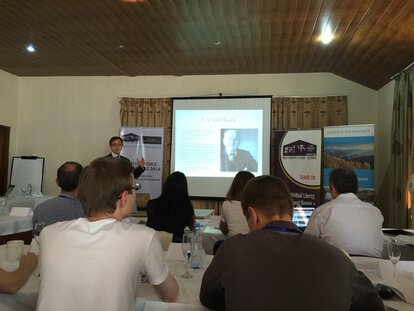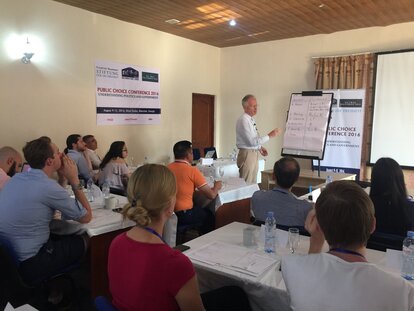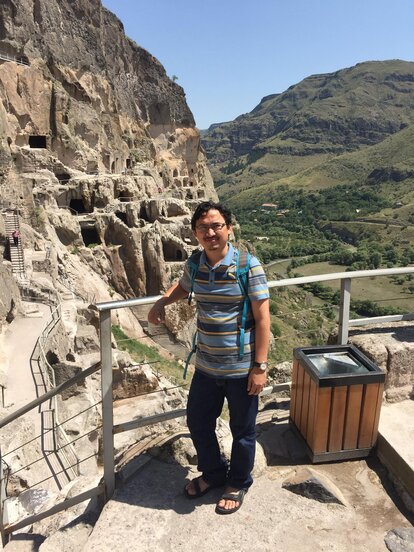event
Public Choice Conference 2016

1.0 Introduction
It was unexpected. I was nominated by Friedrich Naumann Stiftung (FNS), Jakarta Office to attend Public Choice Conference 2016, which was held at Eurika Hotel in Bakuriani, Georgia from 9-15 August 2016. This conference was organized by New Economic School – Georgia (NES-G) and supported by FNS and Global Philanthropic Trust.
I accepted the offer almost instantly, since this is an opportunity for me to enrich my knowledge about Public Choice Theory, a theory I first heard about three years ago. To make it more interesting, there are six scholars from Unites States, France, Italy, Germany and Iran, besides two others are from NES-G, with in depth knowledge and experiences ready to discuss various issues with us, more than 50 participants from 22 countries including Georgia.
It took me more than 20 hours to arrive to Bakuriani. First, I have to fly to Doha, Qatar for a transit, then to Baku, Azerbaijan (short transit, I didn’t get off the plane) before arriving to Tbilisi, Georgia. I took a taxi and meet with other participants at a meeting point before we depart to Bakuriani by bus. I stayed with Muhamad Iksan from Indonesia in a twin-sharing room throughout the conference (picture on the left is our hotel and venue for the conference).
2.0 Lectures
I was quite exhausted during the first day, when Gia Jandieri, Vice President of NES-G and Paata Sheshelidze, President NES-G make a formal opening and introduce us to all faculty members of the Conference.
We have Prof. Dr. Randall Holcombe from Florida State University, United States; Prof. Dr. Edward Stringham from Trinity College, United States; Prof. Dr. Pierre Garello from University of Aix-Marseille, France; Prof. Dr. Roland Vaubel from Manheim University, Germany; Prof. Dr. Morteza Semeti from Isfahan University, Iran and last but not least, Dr. Alberto Mingardi from Bruno Leoni Institute, Italy. After that, all participants introduced ourselves.
Dr. Randall started with Introduction to Public Choice Theory on the first day, by defining the theory as “the use of economic tools to analyze public decision making.”
Thoughout the conference, we had five sessions with him, which he talked about spontaneous order, democratic elections, stability in democratic decision making and why people vote.
Dr. Edward, who is also a disciple of James Buchanan and Gordon Tullock, gave a skeptical views about “why the government may not act in our interest.” He also shared with us in another two sessions about the problem of externalities and private governance.
Participants were exposed to Friedrich von Hayek’s work through three sessions with Dr. Alberto Mingardi, who shared with us about two types of individualism, based on Friedrich von Hayek’s Individualism and Economic Order, which distinguished between the tradition that was developed by Edmund Burke and Jeremy Bentham, besides session on the intellectuals and industrial policy and neo-liberalism and populism.

The most senior Professor, Dr. Roland taught us on the theory of bureaucracy. Although it is a bit technical and ‘old-school’ (he wrote his key points with graphs on paper instead of using powerpoints presentation), it served well to remind all of us about the bureaucrats, as a form of government intervention in the economy. In addition, he also discussed about the public choice analysis of the European Union (EU) and the International Monetary Fund (IMF).
Dr. Piere Garello asked an interesting to all of us, “is there such thing as a good tax?” and discussed with us about tax competition and tax evasion. During the last two sessions, he gave some views about market regulation and competition law and the issue of market mobility, which is widely discussed in Europe of late.
The participants also had chance to learn about Iran, through two lectures delivered by Dr. Morteza Semeti, who discussed about the probability of Iran to achieve a higher growth rate of 6% to 8%, and how oil has been used to cover up government decision making failure in Iran.
Gia and Paata also shared their views in two different lectures. Gia talk about “why the worst get on top” in a democratic election, while Paata delivered a provocative lecture on “why central bank should be abolished.”
Besides all these lectures, we also discussed in a free discussion session about sports and public choice (as the Olympic was held in Rio, Brazil during the same time) and also the land use regulations in each participants’ country.

Extra-ativities
Most participants used their free time to hike the mountains behind our hotel in the early morning before we began our daily conference. Nevertheless, the organizer also arrange a trip to Vardzia, a historical cave town, 3 hours travel by bus. Besides that, we were brought to Rabati Fortress, where they preserved old mosque and church which was built in the same area, and Borjomi-Kharagauli national park.
On the final night, we have sort of cultural presentation, where all participants had participated joyfully by wearing their traditional clothes, bringing their traditional foods and drinks, and also some presentations about their country.
After the conference, some participants (who are yet to leave home) were brought to Free University of Tbilisi for a two-hour discussion with Mr. Vakhtang Lejava, Chancellor of the university, who is now the chief adviser to the Prime-Minister of Georgia.
He was a Deputy Minister of Economic Development who had worked closely with the famous Georgian reformer Mr. Kakha Bendukidze. He shared with us some reform measures taken by Georgia since the revolution in 2003 that makes their economy better compare to other Soviet-secede countries. This included:
a. taxation reform - liberalization, simplification, digitization of the system, eliminating of corruption, opening of international trade;
b. deregulation of business activities;
c. police reform - making it transparent and serving the citizens;
d. reorganizing public institutions, becoming less costly, transparent, open;
e. digitization of state procurement;
f. introducing free markets in the spheres as such: construction, health care, pharmacies, energy generation and provision, water supply, etc.
As the meeting with Chancellor was held early than it was planned, I had extra one day to walk around Tbilisi to see the city before flying back home and three of the participants also joined to a visit to Justice House, an administrative one stop centre where people settle their matters with the government, such as business licensing, marriage registration, land buying etc., in a very effective way.

Conclusion
The best conclusion can be made from the conference is: we can’t get a perfect or better government, but we can always improve our constitutional design to limit the government. The use economic tools to analyze public decision-making can be an important way to understand why we should limit the government and advocate for a freer environment, regardless in politics or economics.
During a feedback session, I mentioned several things that need to be improved by the organizer such as:
i) Provide some reading materials for participants to give some basic ideas about the topic of discussion during the conference,
ii) Give more time for resource person to deliver their lectures, as some of the lectures (especially during the afternoon session) were delivered quite hastily as they are running out of time, and
iii) Include some group discussion activity, as it will bring all participants closer, and also provide some opportunities for us to learn from each country experiences.